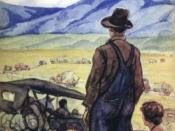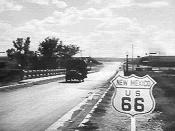THE GRAPES OF WRATH John Steinbeck's The Grapes of Wrath has many implied themes that one can point out after reading the novel. One of the implied themes is the bond between land and people. In this novel we see many examples of this. This theme is important because it shows that the only hope people have is the land that they have. If the land were taken from them, people who farmed it would lose their hope of living because they would have no shelter or food to keep them surviving. The bond between the land and the people was so strong that they did not know what to do without it. The book shows many good examples of this bond.
The Grapes of Wrath is a story about a migrant family who is forced away from their farms and go to California where there is supposed to be jobs.
In California they get work in a peach orchard where they get a nickel for every box of peaches that they pick. When the rain came down, they are again on the move to a drier place because the boxcar and the platform, which they built, were not safe for the water. They finally end up in a barn with some dry hay and find a man dying from starvation.
There are many examples that show the bond between the land and the people when they were asked to leave the land because of the banks. On page 34 we see a good example, "Grampa took up the land, and he had to kill the Indians and drive them away. And Pa was born here, and he killed weeds and snakes"æAn' we was born here. There in the door-our children born here. And Pa had to borrow money. The bank owned the land then, but we stayed and we got a little bit of what we raised."àThis gives us the idea that the land meant everything to them because that is where their family had grown up and they had to endure many things to keep the land. Another quote was carried on page 35, "Sure, cried the tenant men, but it's our land. We measured it and broke it up. We were born on it, and we got killed on it, died on it. Even if it's no good, it's still ours. That's what makes it ours-being born on it, working it, dying on it. That makes ownership, not a paper with numbers on it."àThis bond between land and people is clearly shown in Grampa. On page 121 he tells the other family members that he is not leaving, "I ain't sayin' for you to stay,"àsaid Grampa. "You go right on along. Me-I'm stayin'. I give her a goin'-over all night mos'ly. This here's my country. I b'long here. An' I don't give a godamn if they's oranges an' grapes crowdin' a fella outa bed even. I ain't a-goin'. This country ain't no good, but it's my country"æ"àAfter this they question him on how he is going to live and Grampa says on the next page, "Godamn it. I'm an ol' man, but I can still take care of myself. How's Muley here get along? I can get along as good as him"æTake Granma with ya if ya want, but ya ain't takin' me, an' that's the end of it."àSymbolically, Grampa is dead when Al and Tom takes him away. He is trying to keep the one thing that belonged to him for several years.
There is also an example in the book that shows us that the tenant farmers do not know what to do after they leave the land. On page 34 the squatting men talk about what they can do now, "What do you want us to do? We can't take less share of the crop-we're half starved now. The kids are hungry all the time. We got no clothes, torn an' ragged. If all the neighbors weren't the same, we'd be ashamed to go to meeting."ÃÂ Also on the same page, "The tenant men looked up alarmed. But what'll happen to us? How'll we eat?"ÃÂ This shows us how dependent they are with their land and without it they do not know what will happen to them.
Steinbeck's The Grapes of Wrath had many implied themes, but one of the most important was the bond between land and people. This book showed us how some people would stay with their land even if they knew something bad was going to happen. Steinbeck probably used the character of Grampa to die when he is removed from the land to show people that you should never give up something that belonged to you for many years. When he refuses to leave the land, he is attempting to hold on to the last thing that he understands. The theme about the bond between land and the people is important because here Steinbeck shows that if you keep something valuable that belonged to you, you will be happy and have a good future, but if you lose a valuable thing, you will be lost and your future will be crushed.





